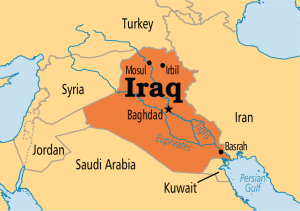USA preparing a long military campaign in Iraq
Monday, August 11th, 2014 12:15:45 by Maleeha Tareen
United States prepares for a long military intervention in Iraq. Defeating the jihadists of the Islamic State (EI), which aim to create a caliphate in the heart of the Middle East will require the formation of a multi-denominational government in Baghdad. The world’s leading power is ready to support, but not to lead the war effort in a country that invaded in 2003 and he retired in 2011.
No one -not the commander in chief of the United States, Barack Obama knows when it will end, or how, the first American intervention since the bombings in Libya three years ago. There are no quick or easy solutions, according to President Obama, in a war that America tried to forget and, ultimately defining Obama’s legacy when he leaves office in January 2017.
“I do not think we solve this problem in a few weeks. Take some time,” Obama said Saturday in the garden of the White House before flying to the island of Martha ‘s Vineyard (Massachusetts), where the first family will spend two weeks vacation. “This is a long term project.”
The president authorized an air mission on Thursday to prevent insurgents conquer Erbil, capital of Iraqi Kurdistan, and to protect the Yazidis, members of a religious minority under siege and in danger of running out of food and water on Mount Sinjar in northwestern Iraq. USA excludes the deployment of troops.
The immediate objective of the intervention, with the agreement of the Iraqi government, is to protect personnel USA located in Erbil and stop a genocide that has resurrected memories of Rwanda and Bosnia.
But the mission goes further. It aims to prevent the EI establish a permanent stronghold in one of the most unstable regions of the world. This, however, will require an “inclusive ” government in Iraq and a new prime minister, Obama said.
No trace of arrogance in the return of the United States to Iraq, the country in the past decade wrecked chimera of Obama’s predecessor, George W. Bush, to democratize the Middle East. On the contrary, Obama insists on the limits of American power. “There will be an American solution to this problem,” he said.
The decision to intervene was not in the plans of Washington. Obama, who in 2009 came to the White House with the promise to end the Iraq war, attacks conditioned to a reconciliation of the leaders of Iraq. USA attributed to Shiite Nuri al-Maliki, prime minister from 2006 until about Washington’s man in Iraq, part of the responsibility for the conflict by its sectarian policies against Sunni months ago.
Advances of EI, which threatened to Iraqi Kurdistan, the most pro-american- Iraq and American military and diplomats stationed there, alter the calculations. USA did not want a repeat of the assault Erbil in September 2012 in Benghazi (Libya), where four Americans, including Ambassador to Libya died. Benghazi has become synonymous with the weaknesses of Obama ‘s foreign policy.
The threat of extermination of the Yazidis eventually force the president to do what has been reluctant to do so far: return to Iraq.
On Friday the shelling started with F-18s and drones and drones against EI positions near Erbil. The attacks destroyed weapons and equipment of the rebels, according to Obama. Some of the material in the hands of EI is made in USA, USA supplied weapons to the armed forces in Iraq and that they have lost during the jihadist offensive in recent months.
American forces on Saturday fired four rounds of attacks jihadist positions for another purpose, to protect the Yezidis, according to a statement from the United States Central Command. Aircraft and drones bombed armored vehicles firing on civilians near Sinjar.
USA has launched several rounds of humanitarian aid, and foods -waters the Yazidis. UK and France join this operation, Obama said after speaking by phone with British Prime Minister David Cameron and French President François Hollande.
Experts from the United States government prepared with allies and with the UN the possible creation of a corridor for refugees escaping from Mount Sinjar. The information arrive in eyedropper.
“No water, no food, no place to sit, not even a shadow,” one refugee, Jalal Din Shoraf, told The New York Times. Reuters collects testimonies in the villages of Koja, and Qaboshi Hatimiya in northern Iraq, claiming that the jihadists have threatened to kill EI 300 families in these villages unless they convert to Islam.
Tags: Iraq, United StatesShort URL: https://www.newspakistan.pk/?p=47264

















